War of 1812 Info
war of 1812 Info
Prelude to 1812 War
War of 1812 Info
1809-1810
At the dawn of the 19th century, the former united colonies, now 13 states, were in their formative stage of constructing a democratic republic. In 1809, they elected a new president to succeed Thomas Jefferson. James Madison, a wounded veteran of the Revolutionary War, had already established his fidelity to democratic principles when he proposed the first 10 Amendments (Bill of Rights) to the United States Constitution. Those principles were adopted in 1791. His presidential tenure (1809-1817) began under the same war clouds that Jefferson had attempted to ignore.
 |
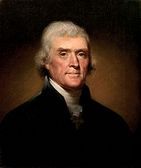 |
War of 1812 Info
|
War of 1812 Info
|
Before the smoke had cleared on the Yorktown battlefield signalling the end of American involvement (1781), the enmity between the the British and French was transferred to European shores and stretched into Caribbean waters. At that time, American economic activity was dependent on international trade. Their merchant fleet in 1793 was subject to a replay of their war for independence. United States ships were boarded and seized, and American sailors were pressed into service in foreign navies. A decade before it had been only by a British enemy. Now their old ally, France, was engaging in the same practice. The British codified this policy by issuing Orders in Council which were duplicated by Napoleon's government in 1810 (Rambouillet Decree). Some contemporary citizens posed a question that historical studies have failed to answer. Why not declare war against France for the same hostile acts that led to war with Great Britain? Aside from the fact, that the United States could not fight Britain and France simultaneously, the choice of enemies probably relied on the friendship with France that was so significant in the American war for independence.
British restrictive policy on the high seas was constantly amended by a series of Orders in Council affecting American international commerce commencing as early as 1793 through the 1812 War. The following is representative of said Orders:
Order on (sic) Council. At the Court at the Queen's Palace, the 26th of April, 1809; Present, the King's Most Excellent Majesty in council.
Whereas, His Majesty, by his order in council of the 11th of November, 1807, was pleased, for the reasons assigned therein, to order that "all the ports and places of France and her allies, or of any other country at war with His Majesty, and all other ports or places in Europe, from which, although not at war with His Majesty, the British flag is excluded, and all ports or places in the colonies belonging to His Majesty's enemies, should from henceforth be subject to the same restrictions in point of trade or navigation as if the same were actually blockaded in the most strict and vigorous manner; and also to prohibit "all trade in articles which are the produce or manufacture of the said countries or colonies----"
Under existing maritime understandings, the actions of the British and French belligerents were clear violations and a sound basis for an American declaration of war. However, Madison, as Jefferson before him, viewed war as antithetical to the principles of their Democratic Republican Party. A new war meant incurring debt at a time when the government was attempting to retire the old Revolutionary War obligations. This philosophy of eliminating debt and maintaining low taxes was consistent with the moral virtues of an agrarian nation. Nevertheless, there was a strident faction of congressional war hawks from southern and western frontier states that desired war with England, the annexation of Canada and seizing Florida from Spain.
The pro war faction took exception to the Non-Intercourse Act of 1809 which prohibited trade with England and France, but provided exceptions for good behavior by either country. The law's intent was to prompt respect for American rights and would be relaxed against any belligerent that was deferential to those rights. The immediate impact fell most heavily on America. It created a shortfall of import income that was the greatest source of government revenues, and American farmers bore the brunt of depressed prices for their products which could not reach foreign markets.
Diplomatic relations with Great Britain, albeit strained, maintained an open channel between the nations. David Erskine, British Minister to the United States, mollified President Madison when he announced that the offending Orders in Council would be rescinded. The president ordered the suspension of the Non-Intercourse Act as applied to the British. In the space of time for communications to cross the Atlantic, the British Foreign Secretary rescinded the Erskine declaration and promised enforcement of its policy of naval interdiction. Erskine was recalled and replaced by a very combative minister, Francis Jackson.
President Madison was then in the unenviable position of reversing course and re-instituting the provisions of the Non-Intercourse Act as applied to the British. Dealing with the overbearing Jackson led Madison to insist upon his recall. The British, in a diplomatic slap to Madison, disdainfully left the ministerial post unfilled. Once again American ships were confined to domestic ports repeating the disturbance to their economic lives.
The year 1810 was to witness more diplomatic activity and domestic unrest. The Federalist Party adherents in the northeast were particularly unhappy with Madison's performance. Unlike the hawkish southern and western opinion,the former vying to annex Florida, and the latter to annex Canada, the northeast's interest lie in building trade and profits. Interest groups with differing goals both targeting President Madison. The prospects of war were heightened by the Non-Intercourse Act although that had not been President Madison's intention.
The commercial interests in the New England states were in constant conflict with the "hawkish" interests of the south and west. This conflicting sentiment was present before and during the entire war years. The significance of trade has given rise to the apocryphal story of barrels of a meat shipment from Troy, New York destined for the army. When a soldier asked the meaning of the stamp on the barrels, reading "U.S", the response was that it stood for "Uncle Sam". At the time, as this legend spread, it usually was uttered to denigrate the government.
Inexplicably the Non-Intercourse Act was repealed by the Macon Law and was a tacit acknowledgment of British supremacy on the high seas. The Americans then commenced trade with the British, but lost favor with markets controlled by French forces. This led Napoleon to declare for open trade with the United States and cessation of their prior conduct. Madison responded by moving another chess piece and reimposed restrictions on British trade. Napoleon, in a classic "double-cross" resorted to his old practice, and again attacked United States shipping. The United States was out played, and again faced two enemies on the oceans.
The year 1810 appeared to never end. In order to placate southern unrest, and particularly Georgia's eyes on north eastern Florida,Madison annexed portions of west Florida joining Spanish territory with Jefferson's Louisiana Purchase. New markets opened for American products. Overtures to Spain, an English ally against Napoleon, to purchase the territory were previously spurned.
War of 1812 Info
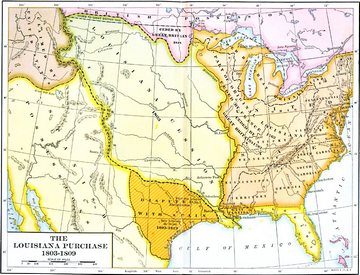
War of 1812 Info
Disputed Boundaries(yellow) and Acquisitions Post Original Purchase
War of 1812 Info
1811
President James Madison had attempted to be faithful to his principles, both moral and economic, to avoid war. It was becoming more apparent to him that war was inevitable and that it was in the national interest to annex Florida.
In January, Madison secretly communicated with the congress to obtain temporary authority to occupy East Florida which they granted. British and French navies were active and effectively bound American shipping to their home ports.
Henry Clay, a much respected congressman from Kentucky, led a drum beat for war with England. This presupposed an accommodation with the French.
Clay was a disciple of Alexander Hamilton's economic philosophy. Maintain high tariffs on foreign goods to spur domestic, industrial production. Clay extended his southern popularity with his western colleagues by supporting expenditures for roadways to connect with the west. His words were influential. In an open letter he was unequivocal and said,
"Let war therefore be forthwith proclaimed against England". He went further and addressed the question of risk to the domestic public, saying: "Do we apprehend danger to ourselves? From what corner will it assail us? From England, and by invasion . The idea is too absurd to merit a moment's consideration".
Clay was too soon to be proved wrong on the question of an English invasion.
By the summer of 1811, Madison announced that the United States had been"pushed to the wall" and he recalled the American Minister to the Court of St. James.
The British maintained their usual disdainful attitude and doubted American resolve. Possibly, they had good reason to believe that American non-intervention was assured. America had no standing army and had reverted to colonial policy dependent on its defense by militia forces. The British navy had a credible air of invincibility which was supported by American inaction in response to severe provocations. Nevertheless, France, showed no inclination to take advantage of the Anglo-American rift, and maintained their war against American shipping.
The American public was engaged in the economic affects of the war focusing on its international trade. This narrow view unfortunately overshadowed the consequences of the expiration of the charter of its central bank. In a reversal of principle, President Madison registered his objection to the loss of the Bank of the United States. The American 1812 war effort would be heavily financed by borrowing. The loss of the national bank, an Alexander Hamilton legacy, required the treasury to borrow from state banks that had no compunction in charging high interest rates, and at the same time fattening their reserves with new federal deposits. Ultimately. Madison was forced to levy a war tax (1813) despite his anti tax principles that was a core belief:
"War is the parent of armies; from these proceed debts and taxes; and armies, and debts, and taxes are the known instrument for bringing the many under the domination of the few."
As 1811 drew to a close, the United States suspected that English officers in Canada were inciting Shawnee tribes in the Indiana territories. This suspicion was supported by the British muskets and other war materiel found on the battlefield dropped or discarded by their Indian allies in their forays against American settlers. Ultimately, history reveals that Britain desired to create an independent Indian nation on the United States western flank and squelch the instinct to expand the country's borders. This expansionist instinct, and constitutionally questionable activity (executive orders) when unilaterally concluded by presidential action, had been highlighted by Jefferson's Louisiana purchase in 1803. Nevertheless, this fete accompli extended the United States borders to the Mississippi River and fed the American appetite for a country stretching from "sea to shining sea"; a singular threat to British interests in the northwest.
General William Henry Harrison, with an enhanced regular army, defeated the Indian tribes at the junction of the Wabash and Tippecanoe Rivers, Indiana territory (November 7). This action burnished the credentials of Harrison as an Indian fighter and led to to his election as the ninth president of the United States. Unfortunately, his term lasted one month as he died in his new office on April 4 1841.
War of 1812 Info
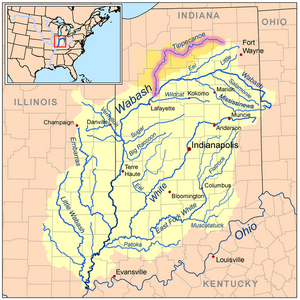
War of 1812 Info
Courtesy of Wikipedia
War of 1812 Info
1812 War Begins
In 1812, Madison was reelected president for a second term over Federalist, northern opposition that demanded a peace policy and an assurance of continued international trade. Madison was still "fence sitting" hoping that Great Britain would relent on its maritime policies. This hope was dashed upon the arrival of United States warship, Hornet, carrying the news that Britain would not change its policy.
The state of Georgia desired annexation of north eastern Florida. They dispatched its militia under General George Mathews in March 1812. He seized a Spanish fort, and that move was rejected by the United States Senate, and repudiated by President Madison. The president, while contemplating war against Great Britain, believed it wise to placate the Spanish government, a British ally.
In June, Congress passed a war resolution without one Federalist vote. Madison, after conferring with Thomas Jefferson, on June 18, issued a Proclamation of War predicated on the seizure of American ships and sailors, and the fixed suspicion of Indian incitement emanating from Canada. Later, it was learned that Britain had agreed to rescind the Orders of Council. Unfortunately, the die had been cast. The earlier declaration was irrevocable. It implicitly restated its hard earned American independence.
War of 1812 Info
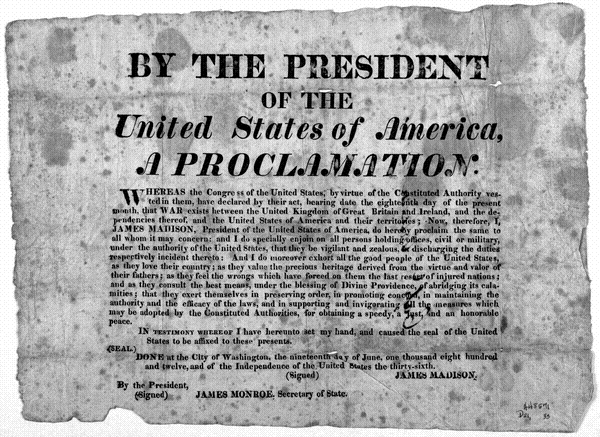
War of 1812 Info
Hostilities on land began with the ill fated invasion of Canada with the ultimate intention to capture Montreal. Generals Henry Dearborn and William Hull were in charge of operations. The former was too hesitant to be effective and the latter had issues with courage. He soon retreated back into Detroit which he readily surrendered to the British. Hull was convicted by Courts Martial and sentenced to die. He was rescued by a Madison pardon pursuant to Article II, Section 2 of the United States Constitution. Both expeditions were dependent on poorly trained militia, and Madison finally understood that a larger regular army had to be raised in order to avoid similar debacles. This position was reinforced when American forces were repulsed on the Niagara River by British Regulars and Tecumseh and his Shawnee Braves.
War of 1812 Info
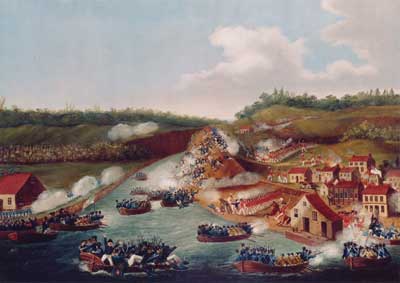
War of 1812 Info
Courtesy of Weir Foundation
Canadian War Museum
The typical economic war time problems with shortages of money to finance the cost of military materiel and food were exacerbated by the inexperience of the Madison cabinet and its changing composition. France, their lender of last resort in the Revolutionary War era, was fighting for its own life inside Russia, and offered no help in response to the plea of Madison's Secretary of the Treasury, Albert Gallatin. Ultimately, Gallatin was instrumental in obtaining loans from wealthy Americans and gaining congressional approval for additional funding for the war.
War of 1812 Info
1813
The United States still had its eyes on Canada despite its Revolutionary War experience. . Some believed in annexation and others to use Canada as a bargaining chip with Great Britain in the American northwest. An American fleet landed a force on the northern shore of Lake Ontario. They attacked the town of York (Toronto), captured the fort and burned and looted the town and then withdrew (April 27). The Americans sustained heavy losses in Canada including the death of Brigadier General Zebulon Pike, namesake of Pike's Peak in Colorado.
War of 1812 Info
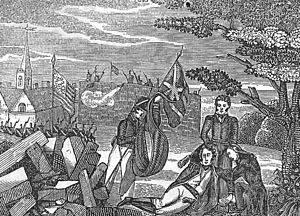
War of 1820 Info
Although the American's were immersed in a war with Britain, they were filling in missing territorial pieces in Florida, Ohio/Indiana and they seized the Mobile area that had been possessed by France, England, and Spain. These territories were now United States soil.
In July of this year, a further measure of respect was regained by the actions of Commodore Oliver Hazard Perry on Lake Erie. His victory was immortalized in a letter to William Henry Harrison:
"We have met the enemy and they are ours; two ships, two brigs, one schooner and one sloop."
A similar report of the Perry victory in his letter to the Secretary of War:
War of 1812 Info
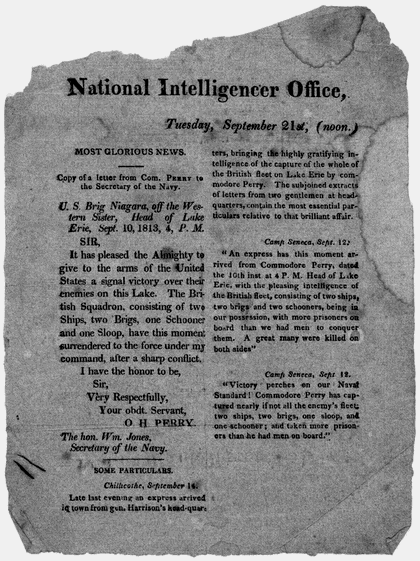
War of 1812 Info
General Harrison of earlier Indian War fame had a new moment of glory at the battle of Thames River (October 15). Earlier in the year, January, he had made an unsuccessful attempt to recover Detroit, but had repulsed further British expansion into northwest territory along the western end of Lake Erie.
The British were not asleep. They also had plans which included revenge for burning York, Canada, and planned on attacking Baltimore, New Orleans and entrenched Americans at the Canadian border. However, while their battle with the French diverted military resources, they were forced to fight a defensive war. That would be altered in 1814.
War of 1812 Info
1814-1815
Britain's defeat of Napoleon in 1814 meant their total attention was devoted to the American continent. They shipped 14 regiments of battle hardened troops to join the fight.
The American's attempts to sustain penetration of the Canadian border were mainly unsuccessful. However, there were pockets of limited success. Under the leadership of General Jacob Brown they were able to cross the Niagara border area, July 3, and seize Fort Erie. Twenty-two days later Brown skillfully broke the British lines at Chippewa River. Casualties were high on both sides, but on September 11, the British were defeated on Lake Champlain. The lake battle was a reprise of the Revolutionary War battle led by Benedict Arnold, albeit more successful than the predecessor.
It was evident to the American commanders that stalemate and casualties were not worth the effort, and they voluntarily withdrew their forces from Canada. The British obviously reached a similar conclusion which closed the chapter on Canada in which 3 American attempted invasions had failed.
However, the British southern strategy was just beginning with summer raids along the Maryland coast led by Maj. General Robert Ross. He was met by a mixed force, regulars and militia, of about 5,000 Americans under Brigadier General William Winder at Bladensburg. The American lines crumbled before the experienced British soldiers leaving an open route to the undefended Washington D.C. capital where they burned the White House and other public structures (August 24-25) . Unquestionably, the motive was revenge and retaliation for the burning of York (Toronto-April 27, 1813). The Madison family never reoccupied the White House.
On September 12, A British force attacked Baltimore and were stopped by American militia. During the assault, the aforementioned General Ross was mortally wounded. Simultaneously, the British fleet was attempting to destroy Fort McHenry held by 1,000 American militia. The pounding cannonade on September 13-14 was witnessed by Francis Scott Key, a prisoner on a British warship, who observed the "rockets red glare" known as "congreves". He then composed the verses of the "The Star Spangled Banner". After his release from British captivity he noted the departure of their entire fleet signifying their failure to reduce the fort to rubble. The Key verses set to music of an old English tune were not declared the American national anthem until congressional action in 1931.
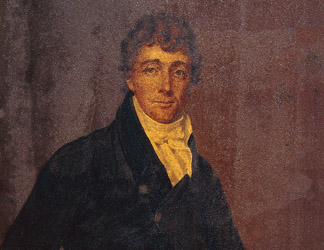 |
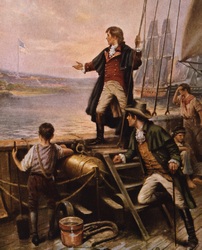 |
The northeastern Federalists had maintained their anti war rhetoric throughout all the hostilities. In 1814, their calls were even more strident at their Hartford Convention. Calls for secession were echoed by the two senators from Massachusetts. However, in the congress, The Democratic-Republicans consistently carried the votes that supported President Madison. The New England Federalists maintained their anti war rhetoric even when an amphibious invasion of British forces were on their doorsteps in neighboring Maine in 1814.
Senator James Lloyd, an avowed opponent of Madison, claimed that the number of impressed United States sailors never amounted to more than the hundreds, and that the president had inflated the numbers to create a cause for war.
His state's counterpart at the Convention, Senator Thomas Pickering, wrote its chairman, George Cabot, "I do not believe in the practicality of a long continual union".
Cabot, somewhat more moderate, responded thusly:
"I greatly fear that separation would be no remedy because the source of them is in the political theories of our country----.I hold democracy in its rational operation to be the government of the worst".
The position of the Federalists on the war was thoroughly discredited. The electorate turned its back on that party. By 1815, they no longer existed. Many of their economic philosophies were adopted by the new Whig Party.
Concurrent events
in Belgium eliminated further, potential action from the northeast.The
call for disunion and the establishment of a northen sovereign nation
became a non issue, but an omen of southern actions almost 50 years
later.
The second prong of Britain's southern strategy was aimed at New Orleans. On December 23-24, Major General Andrew Jackson conducted a night attack on the British lines. This was fresh off his victory against the Creek Indians at Horseshoe Bend, Alabama which had prompted Madison to appoint him to command the defenses of New Orleans. This provided time for an orderly withdrawal and time to build stout breastworks that were "armored" with cotton bales. He had about 3,500 men to face over 5,000. The Jackson force consisted of militia, pirates, slaves, freed slaves many of whom were forced into service by the general.
On New Year's Day, 1815, the forces engaged in an artillery duel which was won by the Americans. January 8, the British made a frontal attack. The American lines held and the half hour battle was won by the Americans.
Earlier, on December 24, 1814, unknown to the participants in the Battle of New Orleans, a new British government and the the United States, on neutral Belgian soil, signed a peace agreement. The Treaty of Ghent was ratified unanimously by the U.S. Senate on February 16. 1815. It provided the United States received some negligible amount of territory around Lake Superior and Maine and ceded back to the United Kingdom similar territories in Ontario, Canada. Some of the United States concessions on fishing rights and on the Great Lakes were resoundingly rejected by "New Englanders" who did not have the last say. Nevertheless, the opening passages of the Treaty expressed the parties aspirations:
ARTICLE THE FIRST.
There shall be a firm and universal Peace between His Britannic Majesty and the United States, and between their respective Countries, Territories, Cities, Towns, and People of every degree (sic) without exception of places or persons. All hostilities both by sea and land shall cease as soon as this Treaty shall have been ratified by both parties as hereinafter mentioned. All territory, places, and possessions whatsoever taken by either party from the other during the war, or which may be taken after the signing of this Treaty, excepting only the Islands hereinafter mentioned, shall be restored without delay and without causing any destruction or carrying away any of the Artillery or other public property originally captured in the said forts or places, and which shall remain therein upon the Exchange of the Ratifications of this Treaty, or any Slaves or other private property; And all Archives, Records, Deeds, and Papers, either of a public nature or belonging to private persons, which in the course of the war may have fallen into the hands of the Officers of either party, shall be, as far as may be practicable, forthwith restored and delivered to the proper authorities and persons to whom they respectively belong. Such of the Islands in the Bay of Passamaquoddy as are claimed by both parties shall remain in the possession of the party in whose occupation they may be at the time of the Exchange of the Ratifications of this Treaty until the decision respecting the title to the said Islands shall have been made in conformity with the fourth Article of this Treaty. No disposition made by this Treaty as to such possession of the Islands and territories claimed by both parties shall in any manner whatever be construed to affect the right of either.
War of 1812 Info
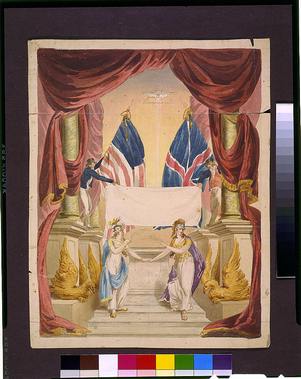
War of 1812 Info
The Treaty Symbolized
John Rubens Smith
War of 1812 Info
__________________________________________________________
War of 1812 Info Sources:
Battlefield Map Wabash/Tippecanoe based on USGS data June 3, 2008. Author: Kmussek.
Orders of Council. Napoleon Series, April 26, 1809.
Paintings of Madison and Jefferson, White House Historical Association. Courtesy of Wikipedia.-
Treaty of Ghent, Article The First. Yale Law School, The Avalon Project.
Proclamation of War. Historyguy.com
Death of Brigadier General Zebulon Pike. Canadian Department of National Defence.
War of 1812 Info References:
Morison, Samuel Eliot (1972). Oxford History of the American People. New American Library.
War of 1812 Info
American Wars | 1812 War | War of 1812 Info